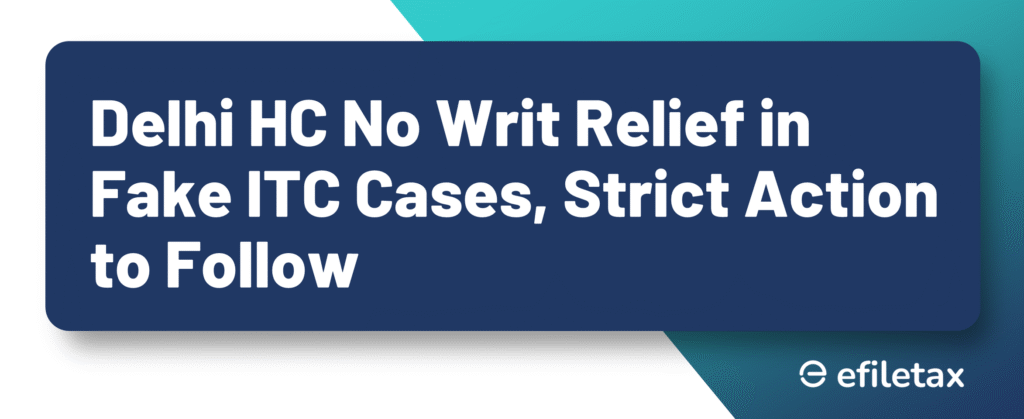
Introduction
Invocation of writ jurisdiction has faced new restrictions as per a recent Delhi High Court ruling involving fraudulent Input Tax Credit (ITC) claims. This ruling clarifies when taxpayers can or cannot approach High Courts under Article 226 in GST disputes.
Background: What is Writ Jurisdiction?
- High Courts have the power under Article 226 of the Constitution to issue writs for enforcement of fundamental and legal rights.
- In GST matters, taxpayers often invoke writ jurisdiction to challenge departmental actions such as blocking of ITC, attachment of bank accounts or provisional assessment.
- However, courts have consistently held that writ jurisdiction should not bypass the statutory appellate and adjudication mechanism under GST laws.
Delhi HC Ruling: The Facts
- In M/s J.P. Glass Industries v. Commissioner of CGST (2024), the petitioner sought to quash an ITC recovery notice.
- The department alleged fraudulent availment of ITC and initiated proceedings under Section 74 of the CGST Act.
- The petitioner directly filed a writ petition before the High Court.
Court’s Observations
- The Delhi High Court refused to entertain the writ petition.
- It noted that:
- Fraud allegations require detailed fact-finding.
- The GST law provides a complete statutory remedy — starting from adjudication by the Proper Officer, followed by appeals under Sections 107 and 112 of the CGST Act.
- Writ jurisdiction cannot be a substitute for the statutory process.
Key Takeaways for Taxpayers
✅ When Writ Can Be Invoked:
- When there is a clear violation of natural justice.
- When the authority acts without jurisdiction.
- In exceptional circumstances like prolonged inaction.
❌ When Writ May Not Be Entertained:
- When alternative remedies are adequate.
- For disputed facts involving evidence and cross-examination.
- Where fraud allegations exist and statutory adjudication is pending.
Relevant Legal Reference
- Article 226 of the Constitution
- Section 74 of CGST Act — Determination of tax not paid or short paid by reason of fraud.
- Recent similar cases: Magnum Ventures Ltd. v. UOI (Delhi HC, 2023).
👉 Readers may refer to official GST rules at www.cbic.gov.in.
Expert Tip
Before filing a writ petition, always check if you have exhausted departmental remedies like reply to SCN, personal hearing, and first appeal. Premature writs may waste time and money.
Summary for Snippet
Delhi High Court recently restricted invocation of writ jurisdiction when fraud allegations in ITC claims arise, directing taxpayers to follow the GST adjudication route under Section 74 instead of bypassing it via writ petitions.
FAQs
Q1: Can I file a writ if my ITC is blocked?
Only if blocking is without legal basis or violates natural justice.
Q2: What is the remedy if fraud is alleged?
You must participate in adjudication under Section 74 and appeal, if needed.
Q3: Is there any timeline for filing appeal under GST?
Yes, generally 3 months for the first appeal under Section 107.
Conclusion
The Delhi HC ruling reinforces that invocation of writ jurisdiction is not a shortcut to avoid GST adjudication. For proper guidance on responding to SCNs and appeals, reach out to our experts at Efiletax today!